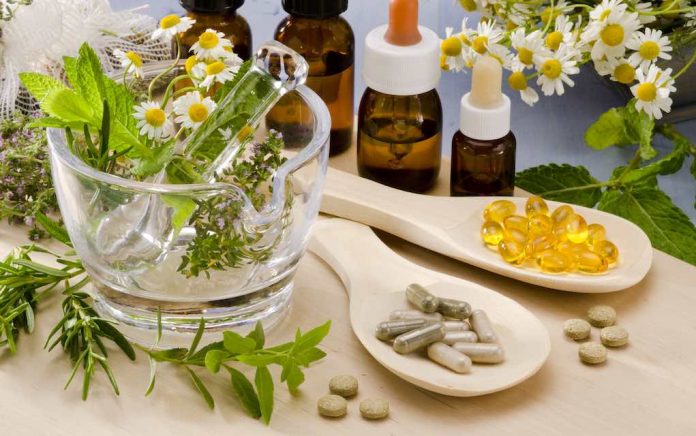
Herbs are available in a variety of forms, and this can make it challenging to decide which of the different types of herbal supplements are best for your needs. In many cases, more than one form of an herb may be the answer. Your final decision should be based on your unique needs, preferences, and health status.
The many ways you can take herbs
Depending on the ingredient, herbal supplements are available as teas (infusions or decoctions), powders, capsules, tablets, tinctures, glycerites, sprays, creams or gels, and essential oils. When possible, it’s recommended that you use only certified organically grown or responsibly sourced herbal products. You also should inform your medical practitioner about your use of any form of an herbal supplement because it may interact with any medications you are taking or a medical condition you have.
Now let’s look at the characteristics of each of the different types of herbal supplements. This information may help you decide which form will best fit your needs and preferences.
Herbal teas
Herbal teas are more accurately called infusions or decoctions because they don’t all come from the tea plant (Camellia sinensis). Instead, they are composed of one or more parts (i.e., leaves, roots, flowers, stems, bark, fruits, seeds) of edible (varied species) plants. These parts are used either fresh or in dried form and then extracted in water to make an herbal tea. The steeping or simmering time depends on the plant part used. Softer parts, such as leaves and flowers, are usually steeped for up to 30 minutes; this is called an infusion. Hard parts, such as roots and bark, are simmered over heat for up to 60 minutes; this is called a decoction.
Use of tea bags and loose tea is not as convenient as tinctures, glycerites, capsules, tablets, or sprays. However, drinking herbal teas is a time-honored tradition enjoyed by people around the world. Herbal teas are often part of people’s routines, whether they kick-start the day, help finish off a meal, or are enjoyed before bedtime.
Read more about the surprising health benefits of tea
Herbal Powders
Like a tincture or glycerite, powders can be mixed with water, juice, or tea and consumed quickly and easily. Another advantage of powdered herbal supplements is the ability to easily adjust the serving size taken. Powdered herbal supplements are not absorbed into the bloodstream as fast as extracts are, however, rather they must go through the digestive process like foods.

Herbal Capsules and Tablets
Herbal supplement capsules and tablets can deliver a measured serving of the desired ingredients in a convenient form. Some capsules can be easily taken apart and the contents mixed with a food or beverage. This is helpful for anyone who has difficulty swallowing capsules or tablets. Capsules tend to be more costly than some other forms of herbal supplements.
A drawback of both capsules and tablets is that they take longer to be absorbed into the body than liquids.
Herbal Tinctures and Glycerites
Tinctures and glycerites are liquid herbal extracts that are made using food-grade solvents (e.g., alcohol, water, glycerin), intended to be used in liquid form. You can use liquid extracts by adding the recommended serving to a small amount of water, juice, or tea. Check each product’s instructions for their suggested use.
Liquid extracts have some advantages over other forms of herbal supplements. Perhaps the most important is that they are more quickly and efficiently absorbed by the body. When the extract makes contact with your mouth, it begins to be absorbed before it ever reaches the digestive system. They are also good for individuals who don’t want to or can’t swallow capsules or tablets. Liquid extracts also usually have a longer shelf life (usually 3 years or longer) and are easy to use (a dropper is usually provided in the bottle). Unlike capsules and tablets, you can taste the herb in the extract, which is a plus or minus, depending on your preference and the herb.
Read more about how to improve digestion
Herbal Sprays
A limited number of herbal supplements are available as a spray for internal use. Herbs in spray form are convenient; you don’t need to look for water to use this form. Elderly adults, young children, and anyone that cannot tolerate capsules or tablets can benefit from liquid extracts and sprays.
Like liquid extracts, and unlike tablets and capsules, herbal sprays, generally speaking, don’t have fillers. However, be sure to check the label to see if there are any preservatives or synthetic flavors in the spray.
Use herbal sprays according to package directions; usually, one or two sprays into the mouth is all it takes. Some sprays made with herbs are for topical use as cosmetics.
Herbal Creams or Gels
Some herbs find their way into creams or gels for topical use. When using topical herbal products, check out the other ingredients for anything that may cause irritation or an allergic reaction.
Essential oils
Many essential oils of herbs are made using steam distillation to extract the volatile compounds in the plant and transform them into a concentrated liquid. These oils are very potent and are used in very small amounts. Most essential oils are inhaled or used topically after being mixed with a carrier oil. Small amounts of essential oils are sometimes used in liquid extracts and can be used orally.
The bottom line
We are fortunate to have a wide variety of ways to take herbs. This means you can more readily find herbal supplement options that fit each of your unique preferences, limitations, and personal needs. Which of the different types of herbal supplements is right for you? Research the various types, discuss them with a knowledgeable professional and make your choice but be sure to check in with your healthcare provider if you are under medical care.







![[Savvy Swaps] Urinary Tract Health Supplements Utiva Savvy Swap cranberry supplement vs cranberry juice](https://naturallysavvy.com/wp-content/uploads/2021/01/1285-Savvy-Swap-Cranberries-TW-218x150.jpg)



